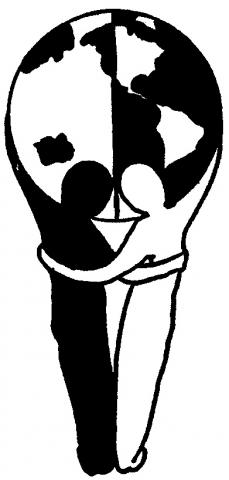
Maryknoll Sister Ann Braudis writes about the aspects of the encyclical of Pope Francis that are in harmony with evolutionary consciousness. Sister Ann holds a doctorate in Applied Cosmic Anthropology from the Asian Social Institute, Philippines, and a Master’s degree in Creation Spirituality from Naropa University, Colorado. The following article was published in the May-June 2016 issue of NewsNotes.
Most of the commentary on Pope Francis’ encyclical letter Laudato Si’ is from the standpoint of its subtitle “Care for our Common Home” and the timeliness of its publication, just weeks before the Paris Climate Talks. Beyond climate change, Laudato Si’ is comprehensive in its description of the environmental breakdown facing the planet. It is honest and transparent in its exhortations and has been hailed as a watershed document. Moreover, it is of highest importance that one of the world’s most significant religious figures stepped before humanity in the exercise of moral leadership on behalf of the entire community of life in this time of undeniable peril.
Apart from its content, the value of this document lies in its harmony with evolutionary consciousness, currently at the edge of visionary perception. Even though the pope is faithful to his role as religious teacher and spiritual guide within a long tradition, he writes largely from understandings, described below, that are newly emerging and aligned with a new way of more fully understanding life.
First and foremost, Pope Francis is informed by truth teachings that include not only Scripture and accumulated spiritual insight, but now also results of scientific research. This is fundamental to the document’s potential for challenging the world to co-create a better future.
Another understanding expressed by Pope Francis in Laudato Si’ that many readers have noted is the value placed on an inclusive character. “I wish to address every person living on this planet,” Pope Francis writes. He calls on everyone to engage in dialogue for the well-being of the planet. He seeks spiritual articulation beyond the confines of Catholicism and refers to our Judeo-Christian tradition when naming compelling moral reasons for caring for the Earth. Even as his embrace is large and his compassionate understanding profound, the pope is straight-forward in calling for the exercise of nobility in the pursuit of moral rectitude and the common good. He achieves inclusivity while avoiding relativism.
Pope Francis writes from yet another understanding that is newly emerging: a shifting worldview. “A strategy for real change calls for rethinking processes in their entirety, for it is not enough to include a few superficial ecological considerations while failing to question the logic which underlies present-day culture,” the pope writes. “A healthy politics needs to be able to take up this challenge.”
Throughout the encyclical, Pope Francis uses the keyword “integral.” “What is needed is a politics, which is far-sighted and capable of a new, integral and interdisciplinary approach to handling different aspects of the [environmental] crisis.” He continually refers to the whole of human civilization. He highlights the positive achievements within worldviews that are otherwise strongly critiqued for being overly materialistic, shortsighted, and environmentally unsustainable. This indicates a fundamental attitude of respect in dialogue with opposing actors.
Finally, Pope Francis expresses an understanding of the qualities of truth, beauty, and goodness, as expressions of the longings of the human heart, where the human spirit and consciousness are ceaselessly touched by and yearn for the Infinite and from which cultural change flows. Evolutionary consciousness also holds these qualities as central to spiritual experience and sees them as dynamic forces, which drive the development of consciousness and cultural change.
In reference to truth, as mentioned above, Pope Francis includes scientific material. He refers to it as a dynamic force or energy exchange whereby the world reveals itself as intelligible yet in need of study in order for people to comprehend and discern its meaning for our lives. “In the universe, shaped by open and intercommunicating systems, we can discern countless forms of relationships and participation,” the pope writes. This is a profound observation; its meaning can only be revealed through deepest reflection and committed study.
Pope Francis quotes the philosopher Paul Ricoeur, who, in the following statement, captures both beauty and goodness as dynamic forces that exchange energy: “I express myself in expressing the world; in my effort to decipher the sacredness of the world, I explore my own.” In conclusion, the pope writes, “At the end, we will find ourselves face to face with the infinite beauty of God and be able to read with admiration and happiness the mystery of the Universe, which with us will share in unending plentitude.”
